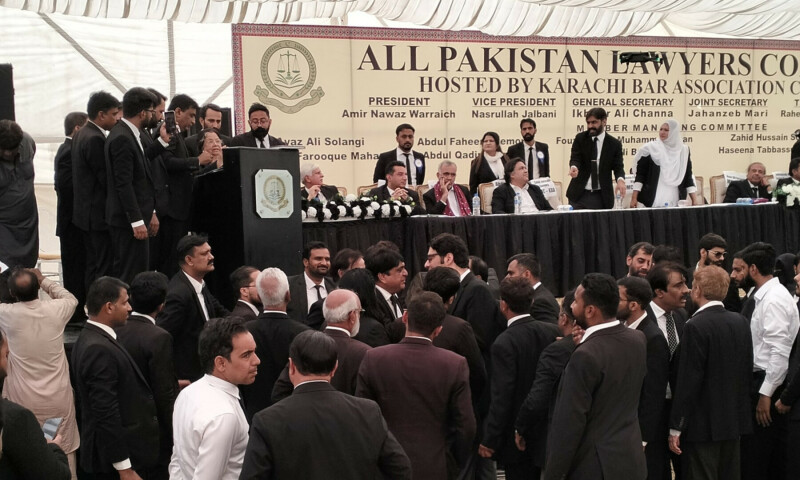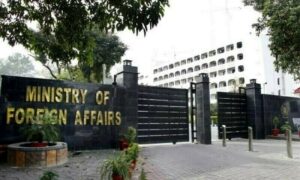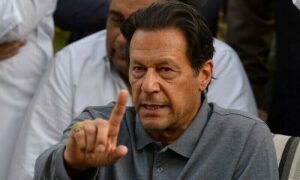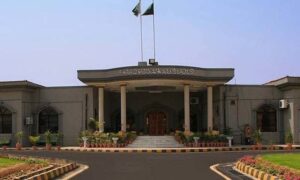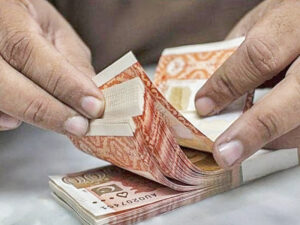• All Pakistan Lawyers Convention passes resolution opposing proposed constitutional court
• Rabbiya Bajwa, Ali Ahmed Kurd’s speeches disrupted by political outbursts
KARACHI: As the ruling coalition prepares to bring judicial reforms through a constitutional amendment, members of the legal community have expressed their opposition to the proposed reforms, saying they would launch a nationwide movement if the government managed to pass the controversial constitutional package.
The All Pakistan Lawyers Convention held at the city courts, however, faced disruption from the outset, when two groups of lawyers with political affiliations, began protesting against each other, despite efforts by the organisers to calm them down.
Karachi Bar Association (KBA) Secretary General Ikhtiar Ali Channa was seen appealing to speakers to refrain from mentioning any political parties or leaders amid sporadic slogans by lawyers in support of their respective parties.
The commotion started when Rabbiya Bajwa, former Lahore High Court Bar Association vice president, had to leave the podium after encountering opposition for criticising the PPP for its role in the proposed amendment bill.
Lawyers affiliated with the party surrounded the stage and began chanting slogans against her, prompting PTI sympathisers to react.
Eventually, Ms Bajwa was allowed to retake the dais to complete her address. But when she returned to the rostrum, she said she would not retract her comments and left the stage.
Meanwhile, Aijaz Somroo, secretary general of the Peoples Lawyers Forum, approached the media table, where reporters were present, and claimed that the lawyers’ forum was being used for “political purposes”.
Opposing the amendment
KBA President Aamir Nawaz Waraich presented a resolution at the conclusion of the hours-long event, opposing the proposed constitutional amendment bill. The lawyers pledged to resist the establishment of the proposed Federal Constitutional Court in the resolution, passed by the majority through a show of hands.
During the event, speakers from various bar associations and councils from across the country warned that the proposed bill would weaken the concept of trichotomy of powers.
They referred to the crisis as a ‘monster’ that would negatively impact the lives of the people while also criticising the alleged role of the establishment in drafting the bill. They also claimed that judges of the proposed Constitutional Court would function like “contractors”.
They stated that if the government succeeds in passing the amendment, they would reject it and launch resistance similar to the 2007 judiciary restoration movement.
Kurd’s speech disrupted
Many participants of the convention were eager to hear what senior lawyer Ali Ahmed Kurd had to say. A veteran of the 2007 lawyers’ movement, Mr Kurd’s address to the convention was a nostalgic moment for many, as they had missed his signature aggressive style and passion.
In his remarks, he criticised the “role of the establishment” in the proposed bill, claiming that they were now “hiding behind a curtain” and expressed hope that the legal community would not allow the proposed amendment to pass.
However, a young lawyer took the microphone from him minutes into the speech, saying they would not allow the amendment to pass under “any circumstances”.
Attempts were made to remove the lawyer from the podium. As tensions rose between the organisers and the lawyer, Mr Kurd shortened his address and also left the rostrum.
‘Over our bodies’
Former Supreme Court Bar Association president and PTI-aligned senior lawyer Hamid Khan emphasised the need for reforms in the judiciary and acknowledged the dissatisfaction with the performance of the Supreme Court and high courts.
However, he cautioned that this did not justify destroying the institution in the guise of a “judicial package”.
“We will not allow the establishment of the Federal Constitutional Court; for us, there is only one constitutional court, and that is the Supreme Court of Pakistan. If it is to be established, it will have to be done over the [dead] bodies of lawyers.”
Mr Khan suggested forming an action committee that would include representation from all lawyers across Pakistan and would determine the future course of action.
Senior counsel Munir A. Malik, another leading figure from the movement for the restoration of the judiciary, said the situation they faced today was more dangerous than the one in 2007, adding that it would be like ‘the final nail’ in the Constitution.
“At that time [referring to the restoration movement], there was only a reference against one judge, but now there is a reference against all judges,” he said, adding, “If this amendment is passed, its aftershocks will be felt for two decades.”
He demanded that the draft be circulated among the lawyer community before being tabled, and their input should be sought. He also suggested that after the Shanghai Cooperation Organisation (SCO) meeting, lawyers should appear in courts wearing black armbands in protest until the draft of the constitutional package would be made public.
It may be noted that the draft of the constitutional package was shared by the government with the Pakistan Bar Council to incorporate the input of lawyers. The PBC’s executive committee reviewed the draft proposals in a series of meetings and forwarded them to the government earlier this month.
Published in Dawn, October 16th, 2024

